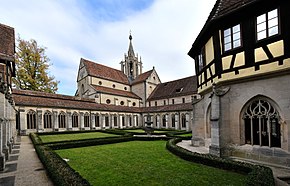| Bebenhausen Abbey | |
|---|---|
Kloster Bebenhausen | |
 Cloister seen from its southwest corner | |
| General information | |
| Location | Bebenhausen, Germany |
| Coordinates | 48°33′35″N 9°03′36″E / 48.55972°N 9.06000°E |
| Owner | Baden-Württemberg |
| Website | |
| www | |
Bebenhausen Abbey (Kloster Bebenhausen) is a former Cistercian monastery complex located in Bebenhausen, Baden-Württemberg, Germany. The complex is also the location of Bebenhausen Palace, a hunting retreat created and maintained by two Kings of Württemberg. The complex was named a historic monument in 1974.
The monastery was established in the late 12th century by the Premonstratensians, but was ceded to the Cistercians in 1190. From the 13th to 15th centuries, Bebenhausen Abbey's fortunes grew rapidly until it became one of the richest monasteries in southern Germany. This period was also one of architectural expansion and renovation for the monastery. In the 14th century, it came under the dominion of the then County of Württemberg, whose rulers were later to dissolve the monastery in the 16th century. The abbey grounds were reused for a boarding school and Protestant seminary. Bebenhausen Abbey was also to play a brief role in post-World War II German politics, as the parliament of the French-controlled state of Württemberg-Hohenzollern devised their constitution at the monastery.
Bebenhausen Abbey also became a residence of the House of Württemberg as a hunting retreat and was especially favored by its rulers for its location in the Schönbuch. Württemberg's first king turned the south-eastern portion of the complex into a palace. After World War I, and the dissolution of the Kingdom of Württemberg, Bebenhausen Palace became the permanent residence of Württemberg's last king and queen.

